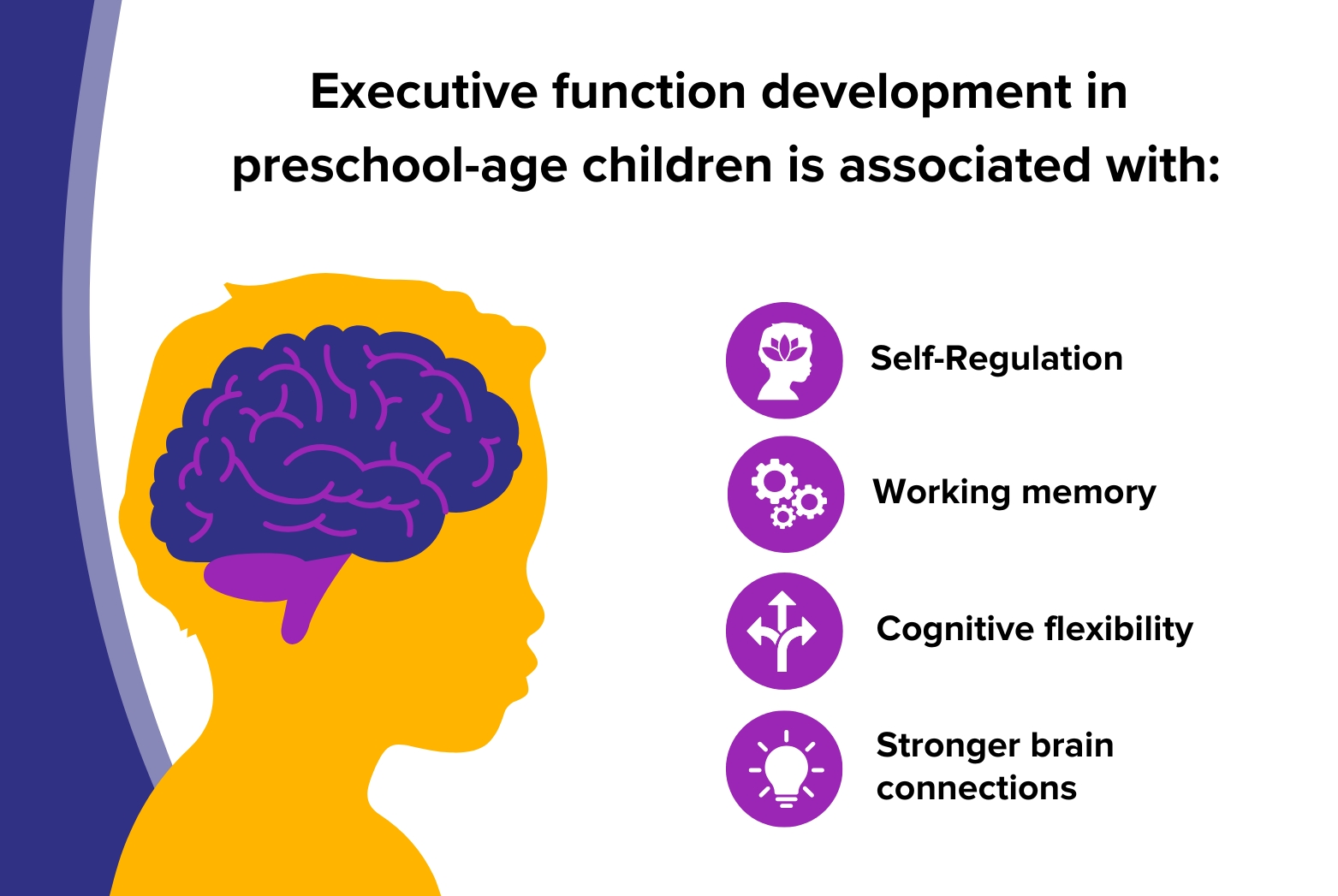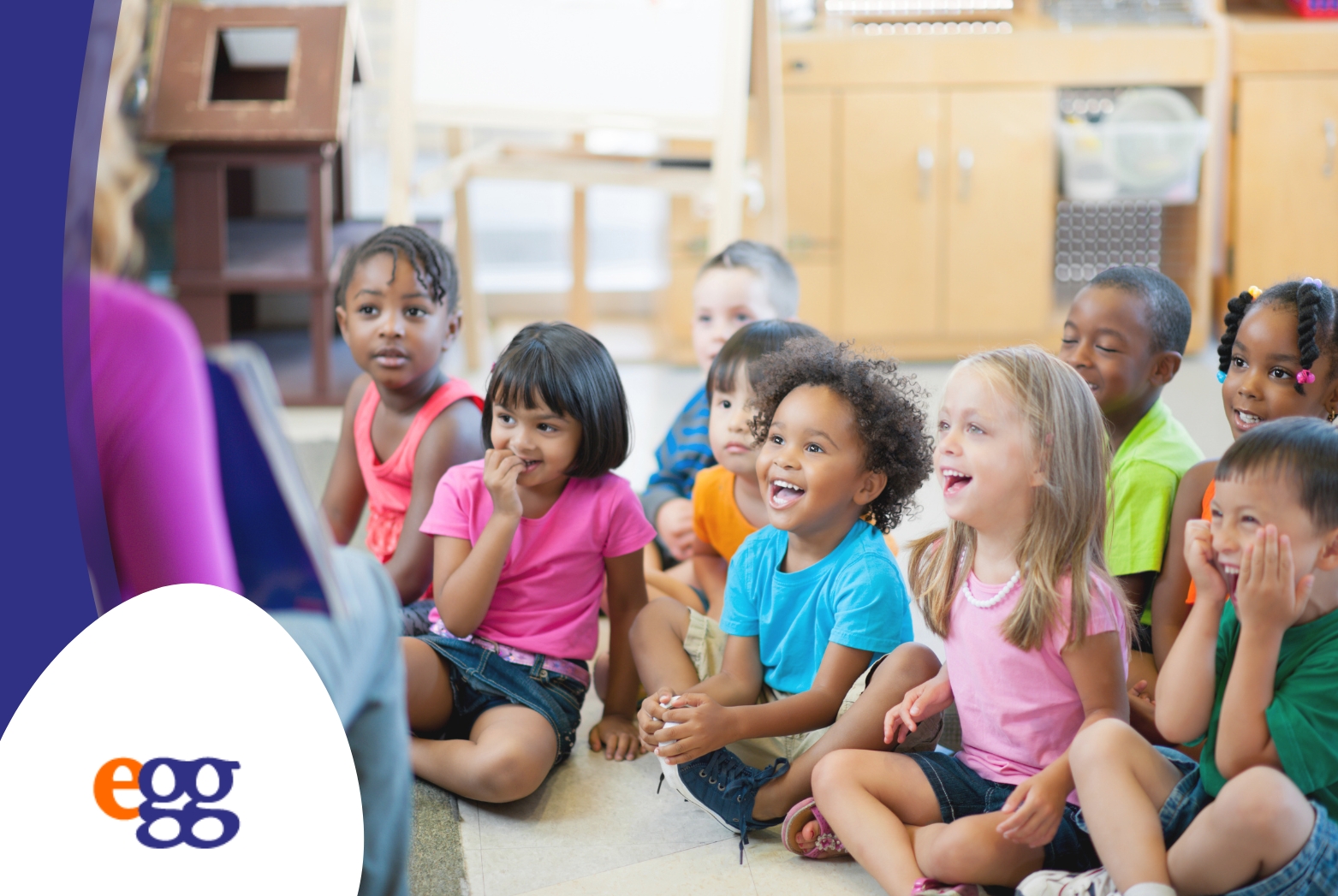During early childhood, executive function and self-regulation skills develop faster than at any other stage of life. These skills are essential for helping young children to build focus, emotional regulation, and resilience—leading to fewer meltdowns and a more joyful classroom!
Preschool teachers play a key role in nurturing these skills. This article addresses some of the most common questions we hear from early childhood professionals about executive functioning, including how to:
Are you ready to crack open the potential of executive function for your preschool classroom? Let’s dive in!
Executive functioning (EF) is a vital set of cognitive skills that preschoolers (and grownups!) use to manage their thoughts, actions, and emotions. In children ages 3 to 5, executive function develops more rapidly than any other time of life, laying the foundation for a lifetime of learning and wellbeing.
Executive functioning (EF) is a vital set of cognitive skills that preschoolers (and grownups!) use to manage their thoughts, actions, and emotions. In children ages 3 to 5, executive function develops more rapidly than any other time of life, laying the foundation for a lifetime of learning and wellbeing.
Understanding how EF evolves in this crucial stage can help preschool teachers support children’s healthy brain development.

Around the age of three years, significant brain growth begins to occur in the pre-frontal cortex (PFC). This part of the brain is associated with executive function skills including self-regulation, working memory, and cognitive flexibility. At this age, the PFC actually grows an overproduction of connections between neurons, also called “synapses”—in fact, twice the number of an adult’s brain! Neural pathways also speed up, creating the optimal conditions for children build new insights and skills.
At the same time, the PFC builds stronger connections with other parts of the brain including:
Over time, the brain will begin “pruning” unused connections that improves a child’s cognitive and sensory processing. You’ll notice this difference by visiting a classroom of 3-year-olds and 5-year-olds. Children’s abilities to follow through on instructions, take turns and pay attention have vastly improved in a short amount of time—and a lot of practice and patience!
As preschool teachers, you hold a unique perspective on each child’s development. For one, you spend several days of the week with them, observing their full range of behaviors: everything from challenges on the bad days to how they shine when making progress. You also see each child’s journey from Point A to Point B—along with every step in between—giving you a finely attuned understanding of each child’s executive function (EF) skills.
When children feel physically and emotionally safe, they are more likely to explore, take risks, an learn from mistakes- critical experiences for executive function development.
Just as important, you create a safe, nurturing learning environment that is the key to assessing and encouraging these skills. When children feel physically and emotionally safe, they are more likely to explore, take risks, and learn from mistakes—critical experiences for executive function development.
As with any skill, every child develops executive function skills at their own pace—shaped by their unique strengths, challenges, and experiences. In the preschool classroom, you can see these differences in how children approach tasks, navigate relationships, and manage their emotions.
In daily routines, children with stronger executive function and self-regulation skills might:
On the other hand, weaker executive function skills may be evident when a child:
If you’re looking for an objective assessment tool, check out our friends at Reflection Sciences. They are experts at measuring children’s executive function skills, beginning as early as age 2. EGG uses Reflection Sciences’ MEFS™ App to measure children’s progress over the school year—with proven results!
Supporting executive function (EF) development in preschoolers is a science and an art—and EGG Toolkit recognizes your vital role as teachers by providing fun, flexible and science-backed activities across 30 modules that are tailored to meet the unique needs of your students. In just 30 minutes per day, you can use the following activities with EGG to help children build EF skills in your classroom.

Group Times focus on building children’s emotional awareness and routine. EGG provides special greeting and closing songs that help children transition into the present moment. By using our feel wheel, you’ll help children give voice to emotions like happy, sad, and angry, which helps them to develop Internal State Language (ISL)—a “building block” of EF.
EGG also includes books for group time with special prompts that allow you to explore emotions further in the context of Narrative, another building block of EF. The prompts create opportunities for you to talk about the book with children at a developmentally appropriate level and encourage their comments to relate the content to their own experiences.
Even better? Our Group Times can be modified to fit your existing classroom routine and schedule—there’s no need to reinvent the wheel!
EGG also provides additional books aligned with our 30 modules, offering children opportunities to explore ideas beyond group time. Whether you introduce More Books during independent or small group reading, you’re supporting children’s curiosity and comprehension. Discussing these books further through provided prompts enhances connections with the module themes and further strengthens children’s Narrative development.
Our hands-on Exploration! Activities invite children to move, play and engage in sensory experiences. EGG’s Exploration! Activities have adaptable rules that encourage cognitive flexibility as children adjust to new challenges. There are a variety of Exploration! Activities that utilize provided materials or materials already present in your classroom, while some are materials-free.
By practicing EF skills through play and repetition, children grow their capacity to exhibit focus and resilience throughout the full day.
Mindful Moments in EGG provide children with tools to regulate their emotions and improve resilience. Along with Internal State Language (ISL) and Narrative, Mindfulness is another key building block for executive functioning. You’ll use techniques like slow, deep breathing, conscious muscle relaxation, and yoga to help children to find their calm and bounce back faster when they’re upset. These short, calming practices can be woven seamlessly into your daily routine—many teachers prefer to use Mindful Moments during times of transition between inside and outside, independent and group time, or even while children wait in line to use the bathroom.
EGG’s My Story/Our Story activities promote individual and collaborative storytelling, where children sequence events and create narratives based on their experiences. These activities strengthen working memory and listening skills, while encouraging teamwork. Children gain additional practice in utilizing Internal State Language (ISL) and Narrative skills that allow them to reflect on their behavior and think about what to do next time.
By integrating EGG Toolkit’s engaging, 30-minute-a-day activities into your preschool program, you can foster executive function development in a way that is joyful and effective. These structured yet flexible strategies help equip children with critical skills for lifelong learning, emotional resilience, and success.
Want to learn more about bringing EGG to your classroom? Contact us today!
Early childhood professionals know how much your work shapes the foundation for a child’s future success. Executive function (EF) skills—like focus and resilience—are essential for learning today and they enable children to thrive academically, socially and emotionally throughout their lives. That’s why “Empowering Generational Greatness,” aka EGG, exists: to give teachers like you proven and practical tools for building EF skills in young learners. As our name suggests, the impact of these skills goes beyond childhood, extending into the next generation as today’s preschool children grow into adults who model healthy behaviors and relationships.

Executive function (EF) skills—like focus and resilience—are essential for learning today and they enable children to thrive academically, socially and emotionally throughout their lives.
When children develop strong EF skills in preschool, they’re better prepared to tackle challenges like focusing on tasks, following multi-step directions, and managing their emotions when things get tough. These abilities are essential for “learning how to learn” and help children excel in areas like math and literacy. Over time, these foundational skills translate into improved academic performance and greater success in school.
EF development also equips children to handle stress and navigate social challenges. Skills like self-regulation and cognitive flexibility help children regulate emotions, resolve conflicts and build healthy relationships with peers and teachers. These positive social connections are crucial for emotional well-being and can act as a buffer against the challenges children may face later in life.
The benefits of EF don’t stop at childhood. Research shows that early EF development influences outcomes like higher educational attainment, better health and increased career opportunities. And the effects ripple forward—when today’s preschoolers grow up, they will pass these strengths on to their own children, fostering secure attachments and creating opportunities for the next generation.
By nurturing EF skills in your classroom, you’re giving children more than just the tools to succeed today. You’re empowering them to build a brighter future for themselves and for generations to come. That’s the heart of EGG Toolkit—supporting preschool teachers and administrators with resources that make it easy to bring proven, joyful EF activities into your classroom environment.
In the wake of COVID-19, we’ve heard from teachers across the U.S. that managing classroom behaviors is more challenging than ever. What’s more, we’re continuing to grapple with disparities in disciplinary practices that disproportionately impact children of color and children with disabilities. Focusing on building executive function (EF) skills in your young learners can transform your classroom into a joyful space with children who know how to identify their feelings, talk about their experiences and regulate their emotions. EF development does more than help children succeed academically; it also provides a critical buffer for those with Adverse Childhood Experiences (ACEs) by protecting their brain development from the harmful effects of trauma and toxic stress.
EF development does more than help children succeed academically; it also provides a critical buffer for those with Adverse Childhood Experiences (ACEs) by protecting their brain development from the harmful effects of trauma and toxic stress.
Preschoolers with ACEs often face difficulties with self-regulation and emotional expression due to the impact of stress on their developing brains. Tailored EF strategies through EGG Toolkit can provide a crucial buffer. Our daily dosage is just 30 minutes per day, helping children grow through small moments of storytelling, play and mindfulness.
Evaluation from the University of Minnesota’s Center for Early Education and Development (CEED) shows that EGG demonstrated a significant impact on emotional descriptive language, positive age-appropriate behavior, and personal narration—all highly correlated with executive function skills. You can use EGG to build brainpower in manageable daily doses so children gain confidence and find joy in their accomplishments—even in the face of adversity.
At EGG, we’re on a mission to ensure every child has the opportunity to thrive in the classroom and beyond. We know that trauma and toxic stress disproportionately impact children in marginalized communities, including Black and Native American children, children from low-income households, and children with disabilities. Addressing these inequities requires culturally responsive teaching practices and inclusive classroom strategies.
We developed EGG in early learning environments where the majority of children are children of color and/or living in low-income households, and many children with developmental delays and disabilities were also represented. In these settings, EGG has demonstrated success in fostering executive function (EF) skills and nurturing positive outcomes for all children, regardless of their starting point. Results from the Minnesota Executive Functioning Scale app from Reflection Sciences showed that children who started below the age-adjusted national median for executive function scored above the age-adjusted national median after using EGG.
By norming our curriculum in diverse communities and utilizing inclusive activities and materials, EGG supports relational safety in your preschool classroom—essential for preschoolers healing from trauma and strengthening EF development. While EGG is a trauma-informed curriculum, we have seen children from all backgrounds experience success through activities in the toolkit.
We know that parent engagement plays a huge role in children’s early learning success—including the development of strong executive function skills. Our friends at Ascend at the Aspen Institute highlight the importance of teacher-caregiver partnerships in boosting kindergarten readiness, reducing behavioral issues, building strong social skills and improving long-term academic success. These outcomes are exactly what EGG is designed for: to help children with the building blocks of executive function for greater outcomes across their lifetimes!
Our friends at Ascend at the Aspen Institute highlight the importance of teacher-caregiver partnerships in boosting kindergarten readiness, reducing behavioral issues, building strong social skills and improving long-term academic success.
As part of our core commitment to “Empower Generational Greatness,” EGG Toolkit offers Home Visiting and Parenting Group adaptations tailored for parents and caregivers. These adaptations of EGG Toolkit equip parents and caregivers with:
By providing parents with the information and resources to support executive function (EF) development at home, parents will see greater benefits in their child’s life—and you’ll see more success in the classroom.
Ready to learn more about bringing executive function tools into your classroom? Contact us and learn how EGG Toolkit can help boost outcomes in your classroom today!
Website Copyright © 2025 Family Partnership